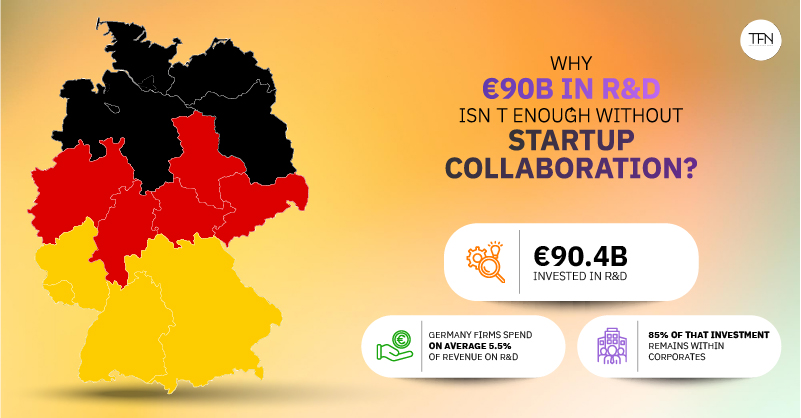Top Stories
Germany’s €90B R&D Investment Falls Short Without Startups

Germany’s status as a global leader in engineering is well-established, with corporations investing a remarkable €90.4 billion in research and development (R&D) in 2023. Despite this substantial financial commitment, a significant issue emerges: over 85% of this investment is confined within corporate walls, limiting the involvement of startups in shaping the innovation landscape. This cautious approach risks Germany’s ability to compete effectively in the rapidly evolving sectors of artificial intelligence (AI) and deep technology.
A recent study by Speedinvest and Bits&Pretzels reveals a stark contrast between Germany and major U.S. tech companies. For instance, firms like Alphabet, Amazon, and Meta direct nearly 30% of their R&D budgets towards external innovations, notably startups. In comparison, traditional German corporations such as Volkswagen and Bosch allocate almost 90% of their innovation spending to internal labs.
The Innovation Dilemma: Pilot Projects vs. Scaling
While Germany excels in initiating pilot projects, the challenge lies in scaling these innovations. Alexander Pöhler, founder of Assemblean, emphasizes that the major barriers arise not at the outset, but after initial success. He notes, “In Germany, there is a great deal of openness to testing new ideas in pilot projects. However, once it comes to integrating the innovation into the core business, things get stuck.”
The issues stem from unclear responsibilities, drawn-out decision-making processes, and a predominant focus on risk avoidance. Corporations prioritize security and compliance, which can hinder the potential of promising innovations. According to Charlotte Goggin, Director at CIBC, avoiding the so-called “pilot trap” requires securing budgets for scaling initiatives, with conditional approvals tied to key performance indicators (KPIs).
Transforming the Innovation Landscape
The cultural landscape in Germany also plays a crucial role in innovation success. Robert Windesheim from Founders Fund points out that while corporations are becoming aware of AI’s value in driving business, traditional industries often lag behind their U.S. counterparts. He stresses that treating pilots like academic exercises rather than business commitments can lead to failure.
To facilitate a more dynamic innovation environment, Sebastian Heinz, CEO of HPB, identifies structural and legal barriers as significant obstacles. He suggests that the focus should shift from exhaustive due diligence to fostering an environment where innovation can thrive. “Innovation needs governance to secure time,” he states.
The report by Speedinvest and Bits&Pretzels highlights the financial benefits of corporate collaboration with startups through mechanisms like Corporate Venture Capital. Companies that engage in these partnerships experience superior growth, profitability, and market valuation. For instance, every additional year of corporate venture capital activity corresponds to an estimated 8.5% increase in price-to-sales multiples among German firms.
Germany’s path toward reclaiming its innovation leadership demands a shift from an insular mindset to a collaborative, partnership-driven ecosystem. Businesses that successfully merge robust internal R&D with agile startup collaboration are poised to harness the technological advancements of the future.
-

 Entertainment3 months ago
Entertainment3 months agoAnn Ming Reflects on ITV’s ‘I Fought the Law’ Drama
-

 Entertainment4 months ago
Entertainment4 months agoKate Garraway Sells £2 Million Home Amid Financial Struggles
-

 Health3 months ago
Health3 months agoKatie Price Faces New Health Concerns After Cancer Symptoms Resurface
-

 Entertainment3 months ago
Entertainment3 months agoCoronation Street’s Carl Webster Faces Trouble with New Affairs
-

 Entertainment3 months ago
Entertainment3 months agoWhere is Tinder Swindler Simon Leviev? Latest Updates Revealed
-

 World2 weeks ago
World2 weeks agoBailey Announces Heartbreaking Split from Rebecca After Reunion
-

 Entertainment2 weeks ago
Entertainment2 weeks agoCoronation Street Fans React as Todd Faces Heartbreaking Choice
-

 Entertainment4 months ago
Entertainment4 months agoMarkiplier Addresses AI Controversy During Livestream Response
-

 Science1 month ago
Science1 month agoBrian Cox Addresses Claims of Alien Probe in 3I/ATLAS Discovery
-

 Health5 months ago
Health5 months agoCarol Vorderman Reflects on Health Scare and Family Support
-

 Entertainment4 months ago
Entertainment4 months agoKim Cattrall Posts Cryptic Message After HBO’s Sequel Cancellation
-

 Entertainment3 months ago
Entertainment3 months agoOlivia Attwood Opens Up About Fallout with Former Best Friend




















